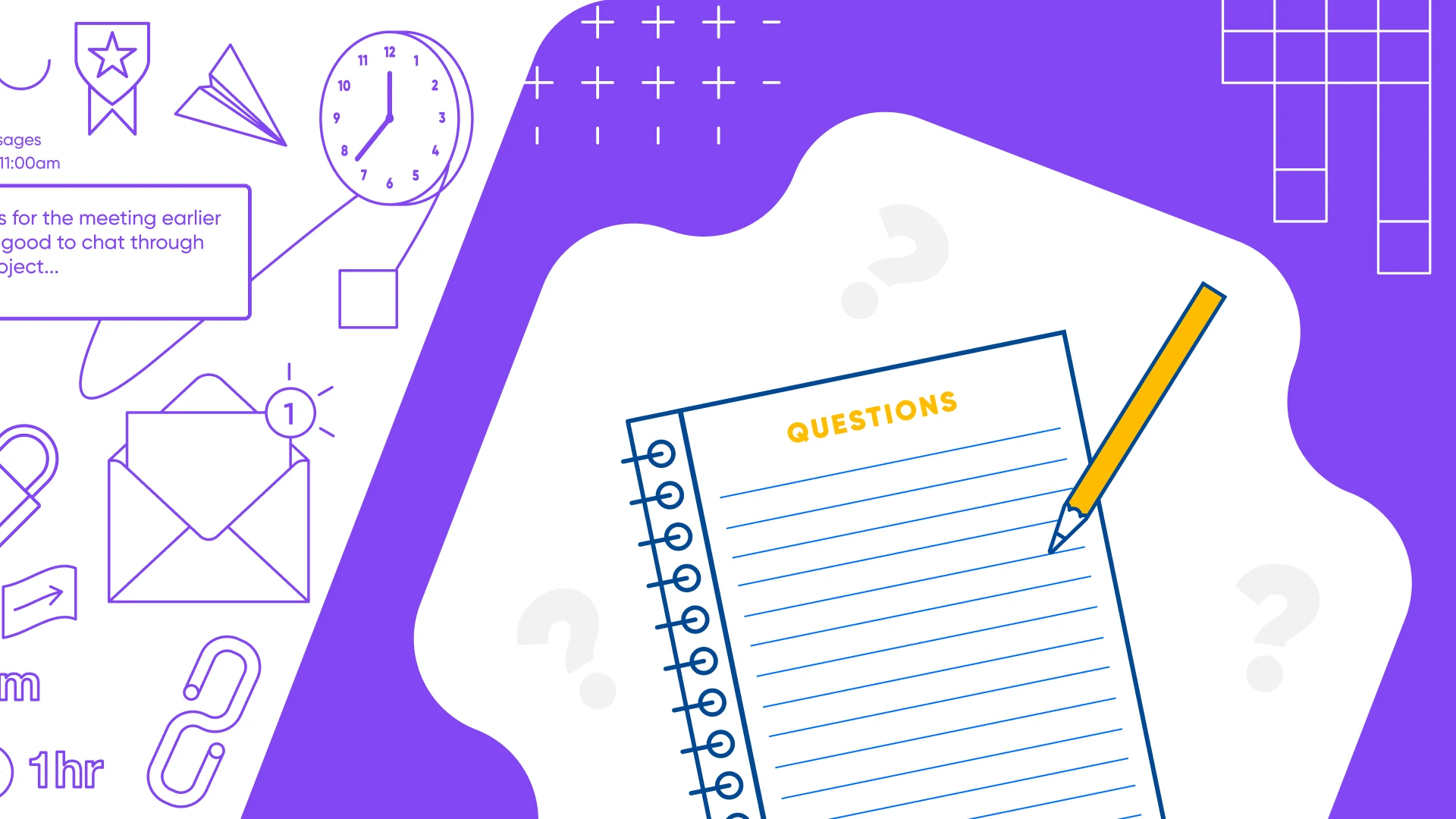Pro tips
Ask these 7 interview questions to hire great remote workers
Use these interview questions to find and hire successful remote team members.
Timree Best
Oct 26, 2022
9 min read
Table of contents
Recruiting remote positions is a different process than recruiting for in-person roles. Finding candidates who will be successful remote workers takes asking interview questions about characteristics unique to remote work, including:
Communication skills to stay connected with managers, teammates, and collaborators
Focus to avoid distractions, maintain work/life balance, and remain engaged with work
Not every candidate has these skills. Hiring remote employees without the right skills risks creating team members who won’t be happy or successful — but will be more likely to leave. Higher attrition rates mean greater costs for your organization, and even more work to hit your recruiting team’s goals.
These remote job interview questions help you quickly identify the candidates who will be the most successful in a remote role. You’ll reduce time to fill metrics, invest more time in the right candidates, and — most importantly — hire people who will thrive when working remotely.
1. Have you worked remotely before (and what challenges did you face)?
The first step in filling a remote role is making sure the candidate is comfortable working outside the traditional office environment. Ask the candidate about remote positions they’ve held or remote companies they’ve worked for, what they think about different aspects of remote work, and — crucially — if they like working remotely.
The goal with this question isn’t just measuring the candidate's remote work experience. It’s also important to see how well the candidate understands the challenges of remote work, such as communicating effectively, maintaining connections, and staying engaged without team members close by. Candidates who have strategies for meeting these challenges will be more successful.
“Every company does remote differently. It's good to see what type of remote environments they've been in and also use it as an opportunity to give more insight on how your company works remotely.”
Becca Scherff
Senior Recruiter at Calendly
On a more basic level, this question helps recruiting teams avoid wasting time during the remote hiring process. For example, a candidate for a fully remote position might actually prefer a hybrid office setup. Or, some job seekers may not have fully understood the job posting. Either way, it’s important to vet candidates who don’t want remote positions so you can focus on the ones who do.
One more important point: Don’t automatically disqualify candidates who haven’t worked remotely. They simply may have never had the opportunity to before. Your goal is finding candidates with the qualities that make good remote team members. The rest of the questions in this guide will help you do that.
2. Have you worked with a distributed team before?
A closely related question is whether the candidate has worked with a distributed team. When remote employees are spread out over different time zones, every team member must have the flexibility and communication skills to collaborate effectively during the workday. This interview question examines how well the candidate has worked with remote teams and how they viewed their experiences.
Start by asking the candidate about how well they adapt to the remote team’s different schedules, and how they could align effectively to hit the team’s goals. You should also ask about the candidate’s plan for getting information and feedback when a hiring manager or teammate isn’t immediately available.
Asking about distributed teams also helps you learn more about the candidate’s project management and problem-solving skills. Ask about how the candidate looks at a new project, assesses how to tackle it, and develops a plan for working with their teammates to complete the work. You’ll get a better sense of how successful they’ll be with minimal direction and supervision.
3. How do you communicate with a remote team?
While you’re talking about working with a remote team, lead into questions about communication style and preferences. Does the candidate like to communicate with team members over email, Slack channels, or instant messaging programs? Do they know which channels are best for certain communication needs? If real-time meetings need to take place, does the candidate prefer phone calls or video calls on Zoom?
It’s also a good idea to see the candidate’s familiarity with apps like Slack and Microsoft Teams to communicate asynchronously, as well as scheduling automation tools like Calendly to quickly find meeting availability between team members or freelancers and contractors for real-time conversations. While candidates may not need direct experience with the tools your organization uses, they should understand the concepts behind these tools and why they’re necessary.
“I'm less concerned about what tools a candidate has used, because any tool can be learned. I want to make sure a distributed environment is right for the candidate and something they’re open to.”
Becca Scherff
Senior Recruiter at Calendly
Asking about communication preferences better aligns expectations between candidates and roles. Teamwork and success depend on staying connected via preferred channels. A candidate who prefers asynchronous communication may create challenges on a team that communicates mainly through video calls. Similarly, a candidate must be able to connect effectively with their hiring manager and ensure projects keep moving forward.
Questions about communication timing and frequency also let you see how well a candidate fits in a remote environment. Is the candidate proactive about getting follow-ups to questions, or do they tend to wait for a reply? Remote workers can’t be barriers to communication. They must be comfortable with your organization's standards for timely responses.
4. How do you stay engaged with a remote team?
While the previous question focuses on communication tools and timing, this question explores the communication skills and soft skills needed for forging relationships. In the past, coffee chats, team happy hours, and other activities built social connections and cross-team relationships. Asking about remote engagement helps you see if the candidate is open to virtual events that strengthen your company culture and values.
Start by asking about the candidate’s previous remote team-building experiences. Did the candidate have opportunities to connect with other team members? Did those events help them feel like part of the team? When in-person “water cooler” interactions aren’t an option, how does the candidate make time to meet other team members?
On a higher level, you can see whether the candidate enjoys virtual team-building events on platforms like Gatheround. If they don’t like small group discussions, you can see if the candidate would rather take part in larger discussions like online leadership Q&A sessions or join Employee Resource Groups (ERGs) to engage with coworkers.
“Engagement questions are a great way to share your company culture and get the candidate excited about joining the team. It's an opportunity to make your remote company stand out.”
Becca Scherff
Senior Recruiter at Calendly
5. Where do you prefer to work?
Even when remote employees don’t need fully equipped home offices, they still need spaces where they can be productive. Asking about a candidate’s preferred physical work environment gives you insight into how effective they’ll be working remotely. Does the candidate plan to work from home, or go to a coffeehouse or co-working space? If they aren’t currently set up to work remotely, what do they need? How do they plan to avoid interruptions during working hours?
While you must ensure the candidate has a distraction-free workspace with a reliable internet connection, these questions aren’t only about the candidate’s physical location. An interview from a kitchen table isn’t necessarily a red flag — they might simply want more natural lighting for your call. This is an opportunity to see whether the candidate has a plan to work efficiently, stay organized, and be productive when working from home.
6. How do you stay focused while working remotely?
Potential distractions are a fact of life in remote work. People sharing a coworking space, family schedules, and noisy environments all affect focus. It’s important to learn how the candidate organizes their time to reduce interruptions and be productive.
Start by asking candidates how they structure their day. Candidates who know when they’re the most productive can more successfully balance their time between deep-focus work and administrative tasks. If there are specific distractions in the work environment, ask the candidate how they plan to minimize them — for example, using noise-canceling headphones or turning a room into a dedicated workspace.
Also ask about their plans for meetings. Can they block off certain hours to concentrate on work? Do they schedule meetings back-to-back or do they build in breaks? Remote workers should be able to make room in their day to shift focus effectively.
“I like to see that a candidate has thought about a personal strategy for remote work. They’ve contemplated the major, as well as nuanced, differences between a traditional office setting and being remote.”
Paige Tanner
Senior Recruiter at Calendly
Candidates who have trouble focusing can work many hours without accomplishing much. Time management questions help you identify candidates who make the best use of their workday.
7. How do you disconnect from work?
After you’ve discussed focus during work hours, follow up by asking candidates how they unplug at the end of the workday. Candidates gain more time without a daily commute, but some may use that time to build more work into their schedules instead of switching off and recharging.
Unfortunately, some remote employers take a "more is always better" approach, squeezing the most possible work out of employees without considering the long-term implications. Candidates who come from such a work environment may not know how to schedule breaks, or speak up when feeling overwhelmed.
“A well-balanced and happy employee will have the greatest long-term impact. Asking a candidate how they switch off at the end of the day can help gauge their work-life balance.”
Paige Tanner
Senior Recruiter at Calendly
You don’t want to be recruiting for this role again in a few months because a new hire can’t balance professional and personal life and leaves due to self-inflicted burnout. Candidates who know how — and when — to switch out of work mode will be more successful.
With all the recruiting challenges in an evolving market, recruiting teams shouldn’t have to worry if filling a remote position will hurt their hiring, retention, and quality of hire metrics. Fortunately, with a good set of remote job interview questions, you’ll discover ideal candidates who will become great remote workers and help your company grow.
Bonus: Schedule interviews with Calendly
Coordinating video interviews with remote candidates can involve a lot of back-and-forth emailing. Calendly eliminates this frustration so you can focus on working with candidates.
With Calendly, recruiters can create a calendar of available time slots and then send the candidate a calendar invite with a personalized scheduling link. The candidate picks the time that’s most convenient, and Calendly adds the meeting to both calendars.
Calendly’s team scheduling features make it easy to organize all types of interviews. For initial candidate screens, a Round Robin meeting link connects a candidate automatically with the first available recruiting team member. When you’re scheduling a candidate to meet with multiple team members at once, Calendly’s group scheduling options align everyone’s schedules quickly.
No matter what type of interview you need to schedule, Calendly helps you accelerate the recruiting process, deliver a better candidate experience, and reduce time to fill metrics.
Webinar: Automate your recruiting process + build candidate pipeline
Related Articles
Don't leave your prospects, customers, and candidates waiting
Calendly eliminates the scheduling back and forth and helps you hit goals faster. Get started in seconds.
Calendly eliminates the scheduling back and forth and helps you hit goals faster. Get started in seconds.



